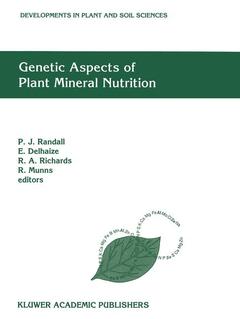Are we justified in breeding wheat for tolerance to acid soils in southern New South Wales?.- Comparison of techniques for determining the effect of aluminium on the growth of, and the inheritance of aluminium tolerance in wheat.- Breeding the perennial pasture grass Phalaris aquatica for acid soils.- Screening perennial rye-grass from New Zealand for aluminium tolerance.- Somaclonal variation in plant adaptation to acid soil in the tropical forage legume Stylosanthes guianensis.- Tolerance to manganese toxicity among cultivars of lucerne (Medicago sativa L.).- Response to soil aluminium of two white clover (Trifolium repens L.) genotypes.- Differences in calcium efficiency between cowpea (Vigna unguiculata (L.) Walp.) cultivars.- Wheat growth responses of cultivars to H+ concentration.- Effect of aluminium on the growth of 34 plant species: A summary of results obtained in low ionic strength solution culture.- Callose formation as parameter for assessing genotypical plant tolerance of aluminium and manganese.- Interspecific differences in aluminium tolerance in relation to root cation-exchange capacity.- Preliminary results from a microscopic examination on the effects of aluminium on the root tips of wheat.- Aluminium toxicity: Towards an understanding of how plant roots react to the physical environment.- Increasing salinity tolerance of grain crops: Is it worthwhile?.- Arguments for the use of physiological criteria for improving the salt tolerance in crops.- Why does in vitro cell selection not improve the salt tolerance of plants?.- Variation and inheritance of sodium transport in rice.- Genetics and physiology of enhanced K/Na discrimination.- Association between genes controlling flowering time and shoot sodium accumulation in the Triticeae.- The inheritance of salt exclusion in woody perennial fruit species.- Variation in growth and ion accumulation between two selected populations of Trifolium repens L. differing in salt tolerance.- The role of ion channels in plant nutrition and prospects for their genetic manipulation.- Effect of salt stress on plant gene expression: A review.- Protein synthesis in halophytes: The influence of potassium, sodium and magnesium in vitro.- Nutrient efficiency — what do we really mean?.- A review of phosphorus efficiency in wheat.- The involvement of mycorrhizas in assessment of genetically dependent efficiency of nutrient uptake and use.- Screening maize inbred lines for tolerance to low-P stress condition.- Inheritance studies of low-phosphorus tolerance in maize (Zea mays L.), grown in a sand-alumina culture medium.- Inheritance of phosphorus response in white clover (Trifolium repens L.).- Heritability of, and relationships between phosphorus and nitrogen concentration in shoot, stolon and root of white clover (Trifolium repens L.).- Polymorphism and physiology of arsenate tolerance in Holcus lanatus L. from an uncontaminated site.- The role of piscidic acid secreted by pigeonpea roots grown in an Alfison with low-P fertility.- Effect of mineral nutrients and combined nitrogen on the growth and nitrogen fixation of Azolla-Anabaena symbiosis.- Can maize cultivars with low mineral nutrient concentrations in the grains help to reduce the need for fertilizers in third world countries?.- A physiological basis for genetic improvement to nitrogen harvest index in wheat.- Post-transcriptional control of the expression of a plant gene by an environmental factor: Sulphur regulation of the expression of the Pea Albumin 1 gene.- Strategies in population development for the improvement of Fe efficiency in soybean.- Genetics of tolerance to iron chlorosis in rice.- Genotypic variation among Indian graminaceous species with respect to phytosiderophore secretion.- Requirement and response of crop cultivars to micronutrients in India — a review.- Selecting zinc-efficient cereal genotypes for soils of low zinc status.- Combining ability of the response to boron deficiency in wheat.- Yield evaluation of a gene for boron tolerance using backcross-derived linesd.- Physiological and genetic control of the tolerance of wheat to high concentrations of boron and implications for plant breeding.- Genetic variation in the response of pea (Pisum sativum L.) to high soil concentrations of boron.- Heavy-metal (Zn, Cd) tolerance in selected clones of duck weed (Lemna minor).- Biosynthesis and metabolic roles of cadystins (?-EC)nG and their precursors in Datura innoxia.- Genes with similarity to metallothionein genes and copper, zinc ligands in Pisum sativum L..




